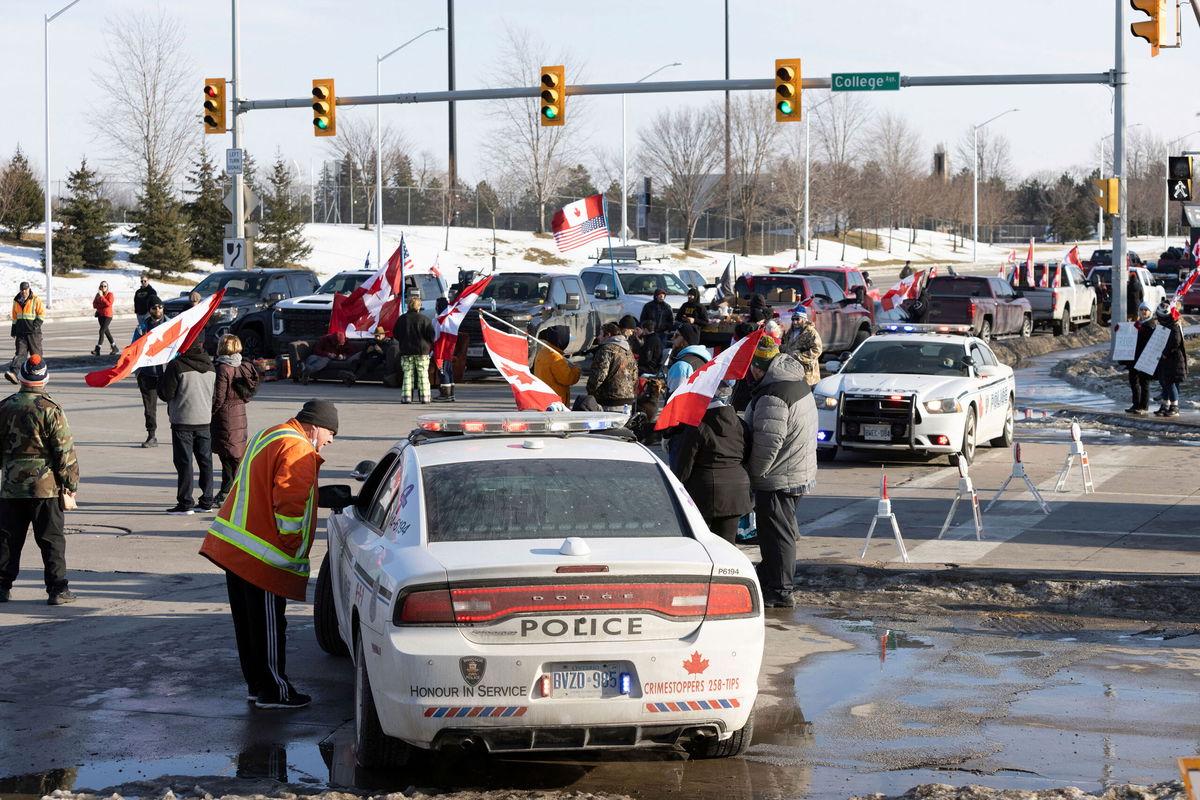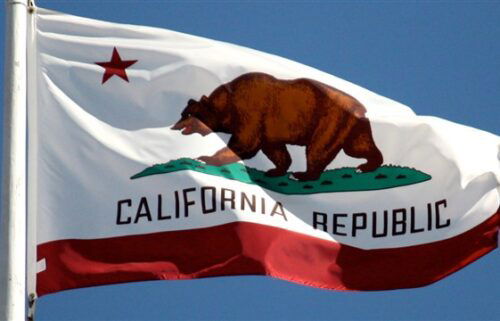Protesters seemed undeterred at critical bridge to US hours past a deadline set by a Canadian judge

People take part in a protest blocking traffic at the Ambassador Bridge
By Paula Newton, Christina Maxouris, Aya Elamroussi and Eric Levenson, CNN
Dozens of demonstrators remained at the busiest international crossing in North America hours past the deadline given by a Canadian judge, continuing their dayslong Covid-19 protest that has interrupted supply chains and alarmed the continent’s leaders.
The judge granted an injunction earlier Friday to the Canadian city of Windsor in Ontario, and a manufacturing association, to allow police to begin clearing the ongoing blockade at the Ambassador Bridge, which connects the city to Detroit, Michigan.
But hours after the judge’s 7 p.m. deadline for the crowds to clear the area, little had changed.
Dozens of people were still on site well after 9 p.m., including many children. People waved Canadian flags, some played music, others danced and joined ongoing chants, while several police cars were parked nearby. There was little telling how long people were planning to stay put.
But officials, including Prime Minister Justin Trudeau, warned earlier Friday the protest had to and would end, pointing to the harmful effects they say it has had on both sides of the border.
“If you joined the protests because you’re tired of Covid, you now need to understand that you are breaking laws,” Trudeau said in a Friday news conference. “You don’t want to end up losing your license, end up with a criminal record, which will impact your job, your livelihood.”
Windsor police warned anyone continuing to block the streets may be committing a criminal offense and could be arrested and charged. Police added charges or convictions related to the protest could “lead to denial in crossing the USA border.”
Drew Dilkens, the city’s mayor, told CNN’s Alisyn Camerota earlier Friday if they were granted the injunction, police would ask protesters to leave and if they refused, “one by one we’ll start towing the cars if required.” But he has acknowledged forcibly removing truckers and protesters could mean further violence, adding things could “escalate very, very quickly.”
Ontario’s premier, who declared a state of emergency, also promised “severe” consequences earlier on Friday for those who are taking part in blockades, saying urgent orders would be enacted to “make crystal clear it is illegal and punishable to block and impede the movement of goods, people and services along critical infrastructure.”
Noncompliance could bring a year in prison and a $100,000 fine, Doug Ford said, adding authorities would consider taking away personal and commercial licenses with anyone who is not complying.
The protests were sparked by truckers who oppose Canada’s new rule requiring them to be fully vaccinated when crossing the Canadian-US border or face a two-week quarantine. Their “Freedom Convoy” has since drawn supporters resisting other Covid-19 preventative measures, including mask mandates, lockdowns and restrictions on gatherings.
Demonstrators have also used semitrailers and sometimes farm equipment to block key Canadian-US access points at Emerson, Manitoba, and Pembina, North Dakota, as well as at the Coutts access point between Alberta and Montana. And for two weeks, they’ve blockaded the downtown core of Ottawa, Canada’s capital — including at its main airport — prompting a judge there to rule they must stop honking.
But Trudeau said Friday many of those protesting do not represent the roughly 90% of truckers who the Canadian government says have been vaccinated against Covid-19. And while much of the country may be tired of Covid-19 restrictions, Trudeau said, the pandemic is not over and “we are going to continue to follow the science and do what is necessary to keep Canadians safe.”
The Canadian protests, explained
Concerns about similar protests in US
American officials worry similar protests soon could erupt in the US, including around Sunday’s Super Bowl in Southern California. Right-wing media outlets have raised the prospect of like-minded rallies in the US and offered positive coverage of those in Canada.
The protests already are “incredibly damaging” to many across the US Midwest, Michigan Gov. Gretchen Whitmer told CNN on Friday, saying the protests have been “hurting us in Michigan since Day 1.”
“We are at an economic crisis because of this illegal blockade,” which is becoming a homeland security issue, Whitmer said.
The Canadian government has to do “whatever it takes” to end the stalemate, she said. “We’re going to do whatever we can to prevent that from happening in the first place” in Michigan.
Trudeau said Friday he had a call with US President Joe Biden, during which they discussed “the American and indeed global influences on the protests … the presence of US citizens in the blockades and the impact of foreign money to fund this illegal activity.”
“President Biden and I both agree that for the security of people and the economy, these blockades cannot continue,” Trudeau said.
Possible solutions include persuading protesters to disburse voluntarily; the government giving into demands; and police removing the protesters. Military force is considered highly unlikely as Canada’s armed forces are not a police force and they “are not involved in law enforcement in this situation,” Defense Minister Anita Anand told CNN.
The Trudeau government will send more officers to protests across the country, saying Thursday the Royal Canadian Mounted Police, Canada’s national police force, continues to show decisive action.
“The RCMP are going to be sending additional reinforcements to Ottawa. I also can advise that the RCMP will be sending reinforcements to Windsor and in addition to that the RCMP have added additional resources at Coutts, in Alberta,” said Marco Mendicino, Canada’s public safety minister.
“Our top priority is to make sure that these illegal blockades end,” he said.
More demonstrators expected in Canada’s capital
Meanwhile in Ottawa, there have been 25 arrests since protests began about two weeks ago and more than 1,500 tickets have been issued for traffic, noise and other violations, police said on their website.
A company that could move the trucks also has been threatened, said the city’s police chief, Peter Sloly.
“At least one of the major tow trucks (company) that would have been able to supply us with the logistics to tow illegal vehicles and to a significant degree reduce the size of the demonstrations has been threatened themselves,” he said. “They have been threatened through some sophisticated online activities and direct threats to harm to their employees and their business.”
Authorities might try other options, Sloly said, adding,”All options are on the table.” A criminal investigation into the threats is underway, Sloly said.
Ottawa Mayor Jim Watson said he expects to see more demonstrators in Canada’s capital this weekend, telling CNN Friday there were about 400 trucks already stationed in and around downtown.
“People have had their peace and quiet disrupted for almost two weeks now,” Watson said.
“It’s completely unacceptable,” the mayor added. “Particularly in the neighborhoods where some of the protesters are going into restaurants and refusing to wear a mask and harassing staff and really being belligerent to the residents of our city.”
Protesters represent vocal minority
The protesting truckers represent a vocal minority among their profession and fellow citizens.
Canada has one of the highest vaccination rates in the world, with about 4 in every 5 Canadians fully vaccinated, according to data from Johns Hopkins University. Nearly 90% of Canada’s truckers are fully vaccinated and eligible to cross the border, according to the government.
Dylan Friesen, a protester in Ottawa, was let go from a job at a transport company in Ontario for not taking the Covid-19 vaccine, he told CNN.
“That’s not right for companies to be able to decide that and take away our right to earn money and support our livelihood,” Friesen said.
Samuel Gauthier, who supports the demonstrators, is unvaccinated, which has prevented him accessing certain businesses in his home province of Quebec, he told CNN.
“I can’t go skiing, I can’t go to Walmart, I can’t go to Canadian Tire, I can’t go to Home Depot, I can’t go to restaurants, I can’t go to bars, I can’t go to the gym,” Gauthier said, noting restrictions in Quebec have been “a bit more intense than in other places in Canada.”
The protesters’ many different requests make the negotiations tricky, Dilkens said.
“I would call them a leaderless group, and frankly, the requests that these folks have, they are not unified,” he said. “There are folks here protesting government, like you’d see at a G-7 or G-20 protest. There are folks that are protesting climate change initiatives, and there are some folks who protesting vaccine mandates.”
Meanwhile, officials are pressing demonstrators to stop blocking the critical pathways.
“I’ve said consistently, we welcome the freedom of people to protest lawfully and peaceful, but this is not a lawful protest,” Alberta Premier Jason Kenney said during a news conference this week.
Correction: An earlier version of this story incorrectly identified the Canadian city whose mayor will seek an injunction Friday. It is Windsor, Ontario.
The-CNN-Wire
™ & © 2022 Cable News Network, Inc., a WarnerMedia Company. All rights reserved.
CNN’s Paradise Afshar, Sharif Paget, Josh Campbell, Tanika Gray, Jason Hanna, Chris Isidore, Chuck Johnston, Paul P. Murphy, Donie O’Sullivan, Raja Razek, Geneva Sands and Lucy Kafanov contributed to this report.

